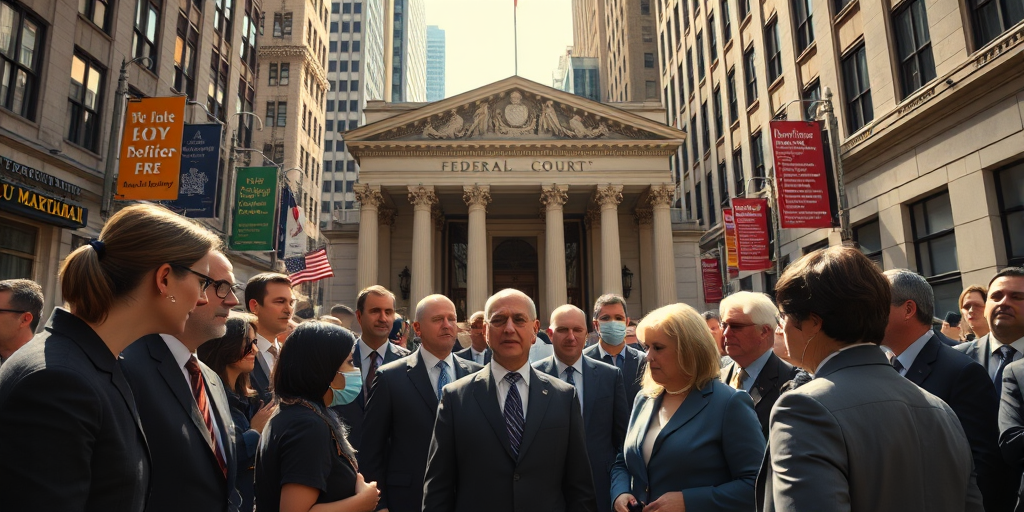States Sue Over Trump Cuts to Research Funding and STEM Diversity Efforts
In a significant legal showdown, sixteen U.S. states have filed a lawsuit against the Trump administration in an attempt to block major budget reductions targeting scientific research and diversity initiatives in STEM (science, technology, engineering, and mathematics) fields. This collective action, lodged in the federal court of Manhattan, challenges the administration’s authority to curtail federal funding and dismantle diversity programs that Congress has mandated.
A Threat to Global STEM Leadership
The lawsuit paints a grim picture of the potential repercussions these cuts could have, particularly in undermining the United States’ long-standing position as a global leader in STEM disciplines. By reducing diversity within STEM, these states argue, the U.S. risks losing critical innovation and leadership.
“The economic and social cost of these arbitrary cuts is immeasurable,” commented New York Attorney General Letitia James. “Science impacts every aspect of our lives, from the technologies we use to the national security efforts we depend on. Curtailing funds will weaken our economy, not to mention hinder our national security.”
Universities Uniting Against Funding Caps
This lawsuit follows closely on the heels of actions taken by 13 major U.S. universities earlier this month. They opposed a decision by the National Science Foundation (NSF) to set a limit on reimbursement for indirect research costs—such as laboratory space and equipment—at just 15%. Similar funding restrictions at the National Institutes of Health and the U.S. Department of Energy were previously blocked temporarily by judges, highlighting a broader pattern of resistance against federal funding reductions in scientific research.
New York’s universities alone benefited substantially from NSF funding last year, receiving $104 million to support critical areas such as microelectronics and climate research. This lawsuit argues that enforcing such funding caps, along with eliminating diversity programs, would devastate these crucial research sectors.
Impact on the Community and Local Economy
For states involved in the lawsuit, including New York, California, Illinois, and New Jersey, the stakes are particularly high. Budget cuts of this scale and nature could severely impact local economies and research infrastructures, creating a ripple effect that reaches far beyond the academic community. The NSF’s proposed budget cut of more than 55% from its $8.8 billion allocation epitomizes the scale of what’s at risk.
In communities that rely heavily on research and STEM industries, these funding cuts are not merely a budgetary concern but a potential catalyst for economic downturns. Julie Morrison, a researcher from a prominent New York university, elaborated on this impact. “Our projects don’t just push the envelope in scientific fields; they create jobs, nurture innovation, and bring millions into local economies,” she asserted. “Without adequate federal support, entire regions could suffer.”
Ongoing Controversy and Perspectives
The states’ argument is twofold: not only do they contend that these cuts infringe on Congress’s power over funding allocations, but they also describe the reductions as “arbitrary and capricious,” thereby violating federal law. Under normal circumstances, any significant change in funding would require legislative input and rationale, a standard many states feel the administration has not met.
On the federal side, the NSF declined to comment on the lawsuit, and the White House has yet to issue a response. This ongoing silence leaves many stakeholders anxious about the future of research and diversity in STEM fields across the nation.
Moving Forward: What’s at Stake?
With the legal challenge in full swing, the broader debate about balancing budget constraints with the need for sustained investment in scientific innovation and diversity remains unresolved. The lawsuit serves not only as a mechanism for directly challenging specific cuts but also as a rallying point for broader resistance against policies that stakeholders argue will harm the nation’s competitiveness and innovation potential.
For the public, and especially in academic and scientific circles, the outcome of this lawsuit will be watched closely, as it represents a critical intersection between politics, science, and societal prosperity.
Residents and institutions looking for more information or wishing to support the ongoing legal efforts can contact participating state attorneys general offices. Community forums and meetings are also anticipated to discuss potential impacts and strategies moving forward.
In the context of this legal battle, “Woke News” remains committed to providing timely updates and thorough analysis, emphasizing the local impact, community interest, and national significance of this critical issue. As the dialogue progresses, understanding its ramifications will prove essential for policymakers, educators, and residents alike—a reminder of the intricate ties between local decisions and national outcomes.







